
Christian History
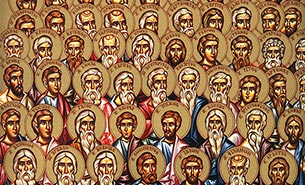
The Seventy Disciples
The seventy disciples or seventy-two disciples (known in the Eastern Christian traditions as the Seventy Apostles) were early emissaries of Jesus mentioned in the Gospel of Luke 10:1–24. According to Luke, the only gospel in which they appear, Jesus appointed them and sent them out in pairs on a specific mission which is detailed in the text. In Western Christianity, they are usually referred to as disciples, whereas in Eastern Christianity they are usually referred to as Apostles… Read more >

Faith: Lukewarm, Cold or Hot?
In Revelation 3:14–21, the Lord is describing the “lukewarm” heart attitude of those in the Laodicean church, an attitude manifested by their deeds. The Laodiceans were neither cold nor hot in relation to God, just lukewarm. Hot water can cleanse and purify; cold water can refresh and enliven. But lukewarm water carries no similar value. The Laodiceans understood the Lord’s analogy because their city drinking water came over an aqueduct from a spring six miles to the south, and it arrived disgustingly lukewarm. Laodicean water was not hot like the nearby hot springs that people… Read more >
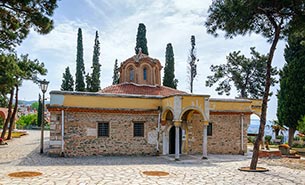
Biblical Sites In Greece
Greece is very famous around the world for the unique masterpieces of Art. These masterpieces are mainly sanctuary and temples built to honor the ancient religion of the twelve Olympian Gods. You can see the ancient religion everywhere in Greece. The fact that the Ancient Greeks worshiped to many gods proves that were very faithful as according to their religious habits they had two essentials concepts: Hubris and the fear of the God. Greeks was so faithful that they have dedicated an altar to the Unknown God in case that they have forgotten someone. The critical point in the religious history of Greece is Paul’s second missionary journey… Read more >
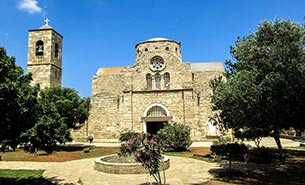
Cyprus: The Land Of Barnabas
Cyprus was the "Chittim" of the Old Testament (Numbers 24:24). The Greek colonists gave it the name of Kypros, from the cyprus, i.e., the henna, which grew on this island. It was originally inhabited by Phoenicians. In B.C. 477 it fell under the dominion of the Greeks; and became a Roman province B.C. 58. In ancient times it was a center of great commercial activity. Corn and wine and oil were produced here in the greatest perfection. It was rich also in timber and in mineral wealth. It is first mentioned in the New Testament ( Acts 4:36 ) as the native place of Barnabas. It was the scene of Paul's first missionary labours ( 13:4-13 ), when he and Barnabas and John Mark were sent forth by the church of Antioch. It was afterwards visited by Barnabas and Mark alone … Read more >
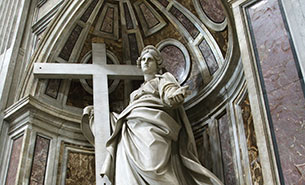
Christian Pilgrimage
Christianity has a strong tradition of pilgrimages, both to sites relevant to the New Testament narrative (especially in the Holy Land) and to sites associated with later saints or miracles. The first pilgrimages were made to sites connected with the ministry of Jesus. Aside from the early example of Origen, who "in search of the traces of Jesus, the disciples and the prophets",[1] already found local folk prompt to show him the actual location of the Gadarene swine in the mid-3rd century, surviving descriptions of Christian pilgrimages to the Holy Land and Jerusalem date from the 4th century. The Itinerarium Burdigalense ("Bordeaux Itinerary"), the oldest surviving Christian itinerarium, was written by the anonymous "Pilgrim of Bordeaux" recounting the stages of a pilgrimage to Jerusalem in the years 333 and 334… Read more >
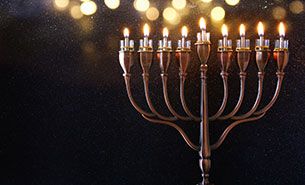
Jewish Communities in Greece
Organized Jewish communities in Greece have a history of over two thousand years. The oldest and most characteristic group that dwelled in the country is the Romaniotes. Apart from the Romaniotes, Greece was the historic center of another large group of Jews, the Sephardites, and Thessaloniki was called in past the "mother of Israel" (Hebrew ir v'em beyisrael). Large communities of Romaniotes existed in Ioannina, Thebes, Chalkida, Corfu, Arta, Corinth, as well as the islands of Crete, Lesvos, Chios, Samos, Rhodes and Cyprus. The Romaniotes are historically distinguished from the Sephardites who settled in Greece (mainly in Thessaloniki, Salonika in Ladino), following Sultan’s permission and determination of location, after the expulsion of the Jews from Spain in 1492… Read more >
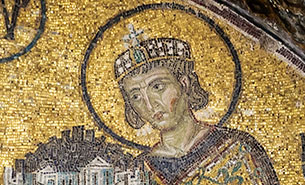
The Edict of the Mediolanum
During the reign of Constantine the Great, Christianity gained the official right to exist and to develop. The first decree favoring Christianity was issued in 311 by Galerius, who was one of his fiercest persecutors. This decree forgave Christians for their resistance to the orders of the state to return to idolatry and to recognize their legitimate right to exist. "Christians," wrote the decree, "can again exist and be assembled, since they do nothing contrary to the common good, and are obliged to pray to their god for our sake, the good of the state and their own ». Two years later, after his victory over Maxentius and his agreement with Likinius, Constantine met with Likinius in Milan, where they issued the extremely interesting document, which is wrongly called the Edict of the Mediolanum… Read more >
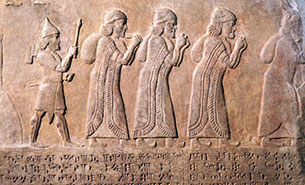
The Jewish Diaspora
The history of Palestinian Judaism is a small part of the history of Judaism of the Hellenistic period, since the siege of Jerusalem (586 BC) most of the population, all of the elite were taken into captivity in Babylon and lived outside Palestine. This situation did not change substantially when, after the fall of Babylon (539 BC), Jews prisoners were allowed to leave Babylon and to come back to Jerusalem. During the Hellenistic period, large population movements were observed by many states, the number of Jews who were dispersed grew drastically, resulting in independent religious and cultural development. In Babylon, the Jewish community remained numerous and dynamic, even after the return to Jerusalem of some part of it, later under Nehemiah and Ezra. The bond between the Jews of Babylon and Palestine has been particularly strong for centuries, even during the Roman period, in the beginnings of which the great Pharisee teacher of Judaism… Read more >
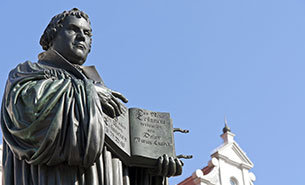
The Reformation
The Reformation was the 16th-century religious, political, intellectual and cultural upheaval that splintered Catholic Europe, setting in place the structures and beliefs that would define the continent in the modern era. In northern and central Europe, reformers like Martin Luther, John Calvin and Henry VIII challenged papal authority and questioned the Catholic Church’s ability to define Christian practice. They argued for a religious and political redistribution of power into the hands of Bible- and pamphlet-reading pastors and princes. The disruption triggered wars, persecutions and the so-called Counter-Reformation, the Catholic Church’s delayed but forceful response to the Protestants. Historians usually date the start of the Protestant Reformation to the 1517 publication of Martin Luther’s “95 Theses.” Its ending can be placed anywhere from the 1555 Peace of Augsburg, which allowed for the coexistence of Catholicism … Read more >


